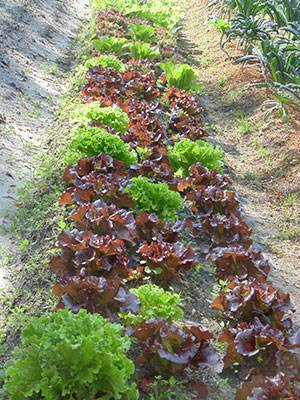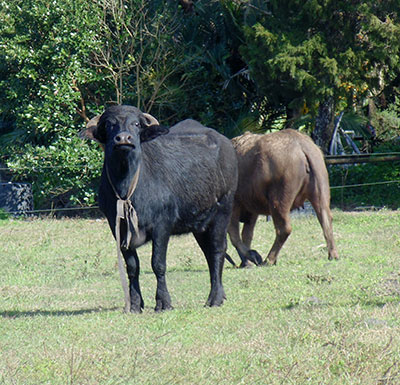By Victoria Parsons
Some sustainability experts sit in air-conditioned offices and make wise recommendations about how governments, big business and academia can minimize their environmental footprints.
Jon Butts, host of WMNF’s Sustainable Living show since 2005, works a 57-acre farm focused on minimizing pollutants like fertilizer and pesticides. Solar panels top his barn and home to cut back electrical use. Water comes from a well on his low-lying property where rainwater slowly percolates through to the aquifer. Chickens, pigs and water buffalo provide nutrients for the spectacular vegetables he and his wife, Debbie, sell at the farmer’s market in Lakeland every Saturday.
“We’re one of the few farms that actually produce what we’re selling, so we almost always sell out,” says Debbie, a former agent at Hillsborough County Extension.

Like all Florida farmers, produce depends upon the season. When I visited in February, rows of multi-colored lettuce contrasted with dark green kale and brilliant broccoli. Later in the season, they’ll switch to vegetables from Africa and the Caribbean that tolerate heat, like chaya and moringa.
They’re also among the few farmers in Florida who produce sugar cane syrup using traditional methods, except the syrup is stirred with an electric golf cart instead of animal power. It usually happens in the late winter with even more old-fashioned gatherings of like-minded friends who help chop wood and stir the raw juice as it simmers and concentrates to become syrup.
But it’s the water buffalo that truly set them apart as farmers. While they’re enormous – up to 1,200 pounds – they’re shy animals and stroll away from strangers with cameras. They eat almost anything that grows in Florida soil, and produce extra-rich milk that can be made into the cheese, butter and kefir that are among the Butts’ most popular products. (By law, the products are labeled for consumption only by animals.)
“They’re very domesticated creatures that have been living with humans since before cattle were domesticated,” Jon says. One of his favorite girls, Peaches, is not happy having a stranger on her field, but quickly makes her way to the gate nearest the stable in case Jon is planning an evening snack of fruit earlier than usual.
Even the fruit and vegetables that the chickens, pigs and buffalo eat are sustainable, he adds. “We get the leftovers from the weekly farmer’s market that other vendors didn’t sell and would have been thrown away otherwise.”
And, of course, Butts’ every-other-Monday show on sustainability is the region’s top program on what local residents can do – or are doing – to reduce their environmental footprint. Wide-ranging topics include organic gardening (of course), permaculture and native plants, solar power, community living options, alternative transportation and even education and ethics.
Like much in life, both ventures started out serendipitously without long-term planning. “Rob (Lorei, WMNF’s news and public affairs director) asked for some ideas on a show and we’d been talking about some other things, so he asked me to do Sustainable Living. I wasn’t sure at first but when you think about it, almost anything can tie back to sustainability. Eleven years later, we’re still going strong.”

Jon brings a real authenticity to the Sustainable Living show, adds Lorei. “There aren’t many people who walk the walk the way Jon and Debbie do. He’s invited guests like Willow Lamont who has actually walked us through the lot and showed us edible herbs that we thought were just weeds.”
Debbie was instrumental in designing the station’s landscaping with native plants that provide habitat for wildlife as well as some food crops like avocado, he adds. “Plantings on the front of the building, which faces south, are now so dense that they block a lot of the heat. We had to install another sign because you couldn’t see through the plants in the summer.”
One of Lorei’s favorite shows was with “Big Daddy” Don Garlits, the Tampa native considered to be the “father of drag racing,” who set a 184 mile-per-hour speed record in an electric-powered dragster in 2014 at the age of 82. “It was really cool to see someone like ‘Big Daddy’ in the 1960s become such a fan of electric cars in 2014.”
Back at home, the farm was actually expected to become a wholesale plant nursery similar to the one Butts’ family had been operating in north Tampa. When the 2008 housing crisis came, though, it wiped out that option so vegetables became the Butts’ primary business.
“We could probably put 50 or 60 head of cattle out here, but we’re doing pretty well with what we have,” he says. They focus on farmer’s markets, and often provide vegetables to a wide range of other local markets although they typically attend only the Lakeland event. “Farming is enough work before you add spending a day at a market,” Debbie says.
They intentionally stay small rather than trying to expand to serve restaurants and other markets. “I’d hate to step out on that limb – I think we’re getting the best bang for the buck with less input rather than trying to grow too much,” Jon adds.
Sustainable Living airs live every other Monday on station WMNF – FM 88.5; podcasts are online at http://www.wmnf.org/events/sustainable-living/.
Editor’s note: This story was written before the Tampa Bay Time’s articles on “farm to fable” stories were published. The Butts apparently are one of only a few local farmers who actually grow the food they sell at local farmer’s markets.